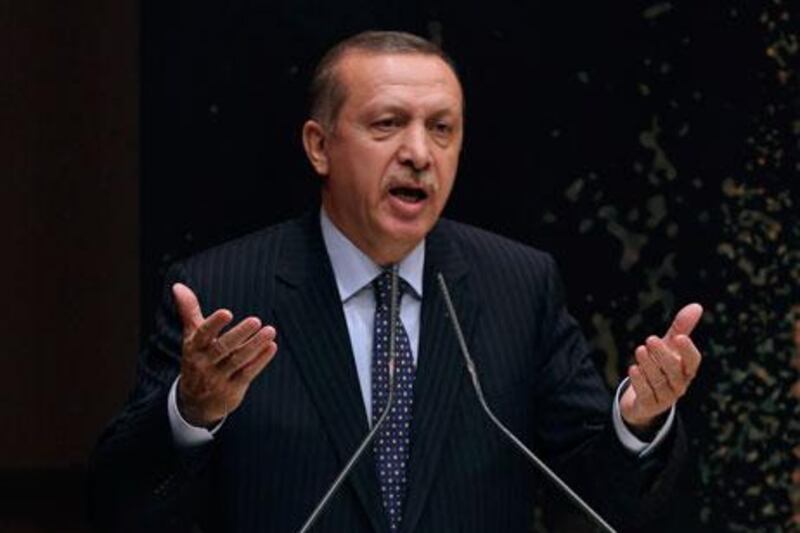ISTANBUL // US concerns over threats from Syria and Iran may have been behind Israel's surprise apology to Turkey after almost three years of a deepening rift, according to comments by officials and analysts yesterday.
Friday's apology for the deaths of nine Turks in an Israeli commando raid on a Turkish ship carrying aid for Gaza in May 2010 removed an obstacle to improving bilateral ties. But relations between Turkey and Israel, both important US allies, will not heal overnight, they said.
Recep Tayyip Erdogan, the Turkish prime minister, confirmed yesterday that the initiative for a phone conversation between him and Israel's prime minister Benjamin Netanyahu that brought the apology came from Barack Obama, the US president, who was on a visit to Israel on Friday.
The US president "called me from Israel," Mr Erdogan told reporters yesterday, according to Turkish news reports. "Netanyahu was sitting next to him. After greeting me, Obama handed the telephone to Netanyahu."
"Netanyahu conveyed his apology on the telephone," Mr Erdogan added.
Turkey's foreign minister, in a television interview late Friday, gave details of the crucial role the US played in getting Israel to apologise.
Speaking on Turkey's state television TRT, Ahmet Davutoglu said US officials mediated between Israel and Turkey for weeks to reach agreement on the wording of the apology, sought by Turkey as a precondition for a normalisation of ties with Israel.
The three parties had agreed that the telephone conversation would take place "while [US president Barack] Obama was with Netanyahu", Mr Davutoglu said.
He added that the call, which lasted 20 to 30 minutes, was conducted via speakerphone on at the Israeli end so that Mr Obama, who was sitting next to Mr Netanyahu, could monitor what was being said.
Turkey said the apology by Israel was a diplomatic victory and that it had not compromised on its demands made after the deaths of the nine activists aboard the Mavi Marmara on May 31, 2010, which was part of a flotilla carrying supplies to Gaza in defiance of an Israeli blockade.
Turkey, which expelled the Israeli ambassador after the incident and restricted bilateral contact to a minimum, had called for an apology by Israel, compensation payments to the victims' families and an end to the Gaza blockade.
"In the end, our demands have been met," Mr Davutoglu said. "If there had not been an apology, this issue would not have been solved in a hundred years."
Mr Erdogan said that Turkey would watch the implementation of Israel's promise of compensation payments and that a new exchange of ambassadors between the two countries may take time. He also said he wanted to travel to Gaza this month or in April, and to Washington in May.
According to statements released by Israel and Turkey, Mr Netanyahu and Mr Erdogan agreed to work on an arrangement for compensation payments, while Mr Netanyahu stressed Israel's decision to ease the flow of humanitarian goods into the Gaza Strip, ruled by the militant Palestinian group Hamas.
In a statement released after Mr Netanyahu's apology, Mr Obama stressed the importance of Israel and Turkey, former partners whose relationship had deteriorated even before the Mavi Marmara incident, for US policy in the region.
"The United States deeply values our close partnerships with both Turkey and Israel, and we attach great importance to the restoration of positive relations between them in order to advance regional peace and security," the statement from the White House said.
Serhat Erkmen, a Middle East expert at Ahi Evran University in Kirsehir in central Turkey, said the US had grown increasingly worried about the crisis between its two allies, especially because of potential threats to Israel's security in the region.
The civil war in Syria, a neighbour of both Turkey and Israel, and the unresolved row surrounding the Iranian nuclear programme, with a military confrontation over Tehran's nuclear ambitions a possibility, had made an Israeli-Turkish rapprochement a priority for Washington, he said.
"Syria and Iran could see significant changes in 2013," Mr Erkmen said. "And if two allies that lie close to those countries are in crisis, that could create problems for the United States."
Mr Erkmen said the situations in Lebanon and Iraq were also causes of concern for Washington. "If there should be a crisis, a joint approach [by the US and its allies] would be impossible without improved relations between Israel and Turkey."
An Israeli official, speaking on condition of anonymity, said better ties could help on many fronts in the region.
"Many topics of security have evolved during the events of the Arab uprisings," the official said, citing "Syrian use of Iranian weapons, soldiers and direction, for one". The official said, in response to questions by email, that regional cooperation was "key to resolving these issues and stabilising the region".
But even after Mr Netanyahu's apology, full normalisation of Israeli-Turkish ties will not be easy.
The Islamic charity that organised the Mavi Marmara mission in 2010 said it wanted a trial in absentia against Israeli officials involved in the raid, currently under way in an Istanbul court, to continue.
"It is out of the question that our clients, the Mavi Marmara victims, will renounce their complaints in connection with the crimes committed in exchange to any payment of compensation," Bulent Yildirim, chairman of the Foundation for Human Rights and Freedoms and Humanitarian Relief (IHH), said in a statement posted on the group's website.
Asked about the trial, Mr Erdogan said that if good progress was being made on Israel's promises for an improvement of ties, there would be "positive contributions" from Turkey.
The Israeli official called for further efforts by both sides to fully normalise ties.
"Hard work with our Turkish counterparts to mend and restore these relations to what they once were" was needed, the official said. "In a sense the hard work behind us is equal to the hard work still waiting ahead."
tseibert@thenational.ae
* With additional reports from Agence France-Presse





